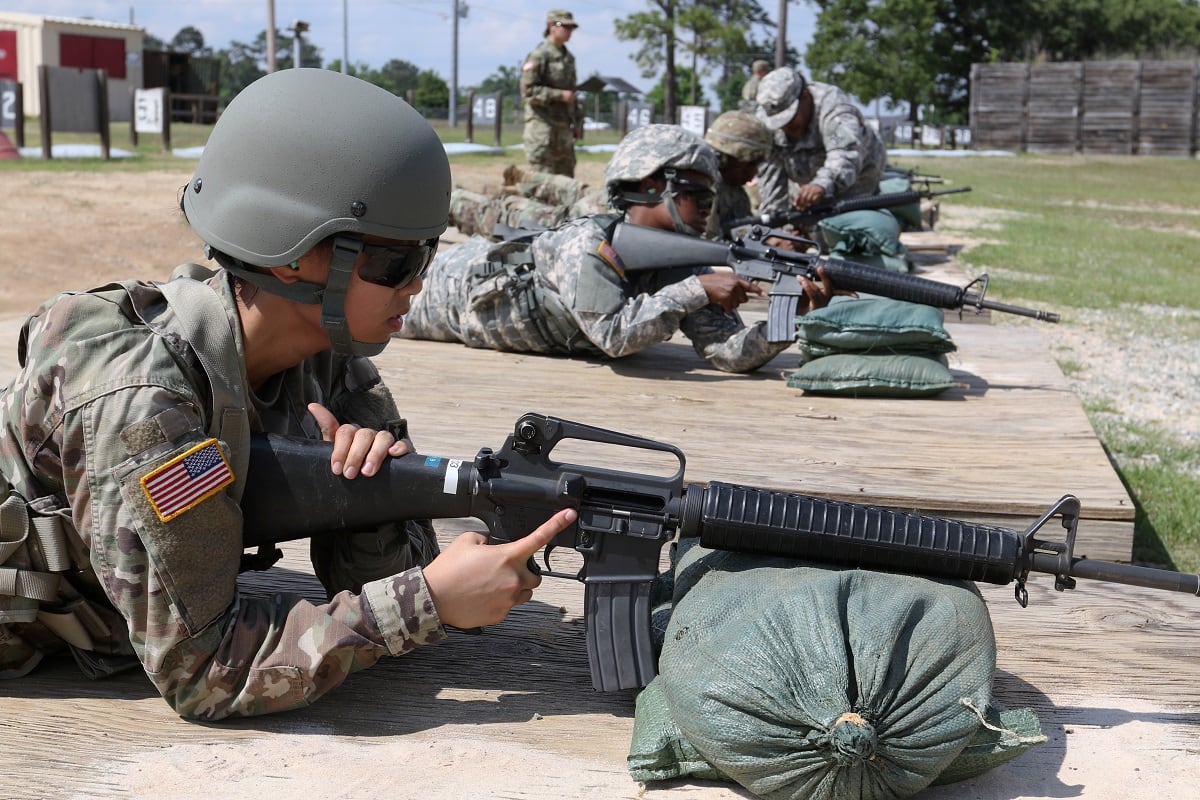WASHINGTON — America’s biggest business lobby wants the Trump administration put the American defense industry first and require the Pentagon to explain the impact on domestic jobs and national security each time it denies a foreign request to buy U.S. weapons.
The U.S. Chamber of Commerce has some 30 recommendations on how to hard-wire economic security and defense-industrial base considerations into the government’s international arms sale decisions. The intent is to see the proposals, which put a heavy accent on business interests, taken up by the administration or Congress.
Defense News was given exclusive access to the recommendations, from the Chamber of Commerce’s new Defense and Aerospace Export Council, before they are made public this week. The recommendations were sent to Peter Navarro, a lead trade adviser to President Donald Trump, and Undersecretary of State for Arms Control and International Security Affairs Andrea Thompson.
“Goals like ‘economic security’ need to be transformed into bureaucratic and organizational imperatives in order to produce near-term impact,” Defense and Aerospace Export Council President Keith Webster said in the June 8 letter to Navarro and Thompson. Webster was President Barack Obama’s last director of international cooperation at the Pentagon.
While the State Department has long been legally bound to notify Congress and seek approval for proposed foreign arms sales, the chamber recommended that any proposed denial of a sale also require a report to Congress.
RELATED

That report would have to explain whether the denied country can get similar equipment from a foreign competitor — and detail the denial’s impact on American jobs, revenue and the U.S. industrial base.
Such reports would also be available to the manufacturer of the item in question, under the proposal. Prime contractors would also be notified in advance of an export authorization denial “to ensure that all economic factors have been taken into account in the decision-making process,” Webster wrote.
The recommendations, if implemented, would impact a number of agencies. Among them, the military services would be required to incorporate economic factors into their technology release baseline policies, and the Office of the Director of National Intelligence would prioritize and monitor defense trade relationships through the global export market.
Andrew Hunter, a former Pentagon acquisition official now with the Center for Strategic and International Studies had yet to see the recommendations, but called “compelling” the idea of government engaging industry and partner nations to propose modifications or solutions to government concerns on stalled cases.
But if the government were required to reveal job impacts when deals are denied, there’s potential for wasted time and resources. That, Hunter said, “may focus too much on deals that may not be viable, and too little on deals that are likely to make the cut with sufficient focus and attention that currently tend to sit in limbo.”
Among other recommendations, the council would have the government — instead of simply turning down countries that cannot adequately secure sensitive defense technologies — list countries with problems doing so and have the Defense Technology Security Administration actively offer to work with those countries to get them up to snuff.
Webster also warned that the State Department hiring freeze, lifted last month, is slowing foreign military sales. The administration, he said, should remedy a 30 percent vacancy rate at State’s Defense Trade Controls Directorate, where the workforce is stressed by growth in foreign military sales as well as a diminished workforce at the Department of Defense.
As a presidential candidate, Trump campaigned on the promise of a giant military spending hike and on creating and protecting domestic jobs. Since taking office, Trump has tweaked arms export regulations and used face-to-face meetings with foreign leaders to pitch U.S. weapons sales, while administration officials have promised a deeper advocacy with foreign officials for defense sales that are in America’s national interest.
RELATED

The chamber’s Defense and Aerospace Export Council hailed the Trump administration’s Conventional Arms Transfer policy, announced in April and aimed at helping private U.S. defense companies directly sell some types of conventional weapons and unmanned drones to allies without them having to go through the U.S. government.
Those policy changes have been criticized both as an over-hyped continuation of a long-standing policy and as emphasizing domestic jobs over human rights.
Bill Hartung, director of the Arms and Security Project at the Center for International Policy, called the Chamber of Commerce’s recommendations “misguided and dangerous” — a view that is likely to be representative of the nonproliferation community at large.
“The Trump administration is already bending over backwards to serve the interests of U.S. arms exporters. The notion that the administration should go further in prioritizing industry’s needs over questions of proliferation and human rights is both misguided and dangerous,” Hartung said. “Weapons are different from any other export and should be subjected to greater scrutiny and stricter criteria. The Chamber of Commerce’s proposals ignore this essential fact.”
However, Webster’s letter warned that counter-proliferation policies aimed at preventing the spread of weapons of mass destruction have had the effect of encouraging some foreign countries to obtain non-U.S. capabilities — all without America’s end-use monitoring requirements, interoperability exercises or the chance for the U.S. to shape policies around their use.
One key area that Webster addresses is easing sales of U.S. military drones overseas. The council would have the administration establish a policy of overcoming the Missile Technology Control Regime’s “strong presumption of denial” for exporting any “category-1” system capable of carrying 500-kilogram payloads for more than 300 kilometers.
The policy would have the State Department and Defense Department evaluate drone export authorization requests as they would manned aerial defense platforms that can deploy like payloads.
Second, the policy would permit the export to nonmembers of the MTCR, an agreement among 35 nations meant to prevent signatories from proliferating longer-range cruise and ballistic missile technology.
Webster presents this as an alternative to amending the MTCR, a laborious process that would allow competitors time to grab the market share. “Urgency is required to sustain U.S. leadership in this market,” he wrote.
Webster argued in his letter that America’s restrictive drone export policy means “China is now able to fill that hole with UASs that look remarkably similar to America’s MQ-1B Predator, MQ-9 Reaper and Global Hawk.”
A new report by the think tank Rand forecast existing export controls will have a negative impact on the U.S. industrial base, while China, Israel and the United Arab Emirates, who are not party to the MCTR, are proliferating their own drones.
U.S. competitors have established themselves in a market set to “grow from about $6 billion in 2015 to about $12 billion in 2025,” Rand found.
Joe Gould was the senior Pentagon reporter for Defense News, covering the intersection of national security policy, politics and the defense industry. He had previously served as Congress reporter.






